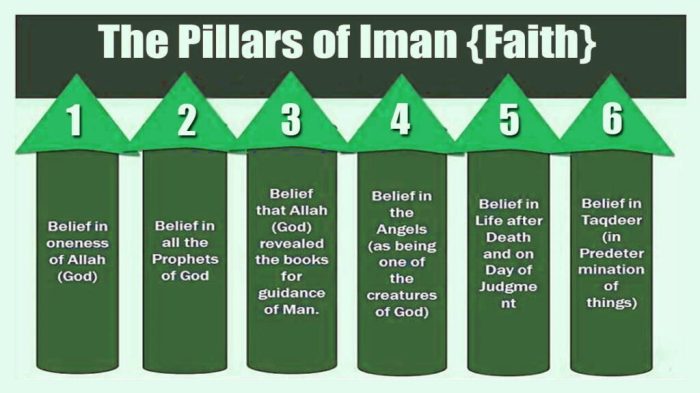What are the six pillars of iman? This fundamental question lies at the heart of Islamic beliefs, shaping the very essence of Muslim identity and guiding daily life. The six pillars of iman, the foundation of faith, serve as a beacon of guidance, illuminating the path towards a deeper understanding of Allah and His divine plan.
These six pillars, interconnected and interdependent, provide a comprehensive framework for comprehending the nature of God, His messengers, and the ultimate destiny of humankind. They encompass belief in Allah, angels, revealed books, prophets and messengers, the Day of Judgment, and predestination.
Iman: The Foundation of Faith

Iman, meaning faith or belief, is the cornerstone of Islamic beliefs, representing the foundational pillar upon which all other aspects of the religion rest. It encompasses a comprehensive understanding and unwavering conviction in the core tenets of Islam, guiding Muslim identity and shaping their daily lives.
Iman is not merely an intellectual assent but rather an active and dynamic force that permeates every aspect of a believer’s existence. It is a multifaceted concept that includes belief in the oneness of God (Allah), His prophets, His revealed books, the angels, the Day of Judgment, and predestination.
These six pillars of Iman are interconnected and mutually reinforcing, forming the bedrock of Muslim faith.
The Six Pillars of Iman

The six pillars of Iman, as Artikeld by the Prophet Muhammad, are:
- Belief in Allah
- Belief in Angels
- Belief in Revealed Books
- Belief in Prophets and Messengers
- Belief in the Day of Judgment
- Belief in Predestination
Each pillar is essential in strengthening and sustaining faith, providing believers with a comprehensive framework for understanding their purpose and place in the universe.
Belief in Allah
Tawhid, the belief in the oneness of Allah, is the central tenet of Islam. It implies that Allah is the sole creator, sustainer, and ruler of the universe, with no partners or equals. Muslims believe that Allah is all-powerful, all-knowing, and all-merciful, and that He is the ultimate source of guidance and protection.
Submitting to the will of Allah and seeking His guidance are essential aspects of Iman. Muslims believe that Allah has revealed His guidance through prophets and messengers throughout history, and that following their teachings is the path to salvation.
Belief in Angels
Angels are celestial beings created by Allah to serve specific roles in the universe. They are believed to be pure, sinless creatures who carry out Allah’s commands and intercede between Him and humans.
Among the most well-known angels are Gabriel, who revealed the Quran to the Prophet Muhammad, and Michael, who is responsible for bringing rain and thunder.
Belief in Revealed Books, What are the six pillars of iman
Muslims believe that Allah has revealed His guidance to humanity through a series of scriptures, including the Quran, the Torah, the Psalms, and the Gospel. The Quran, revealed to the Prophet Muhammad, is considered the final and most complete revelation, containing the complete teachings of Islam.
Studying and following the teachings of the scriptures is essential for Muslims, as they provide guidance on all aspects of life, from personal morality to social justice.
Belief in Prophets and Messengers
Allah has sent prophets and messengers throughout history to guide humanity and convey His message. Muslims believe that Muhammad is the final and greatest prophet, and that his teachings supersede those of all previous prophets.
Prophets are role models for Muslims, demonstrating the highest standards of conduct and providing guidance on how to live a righteous life.
Belief in the Day of Judgment
Muslims believe that there will be a final day of reckoning, known as the Day of Judgment, when all people will be held accountable for their actions in this life. On this day, Allah will judge each person’s deeds and determine their eternal fate.
Preparing for the Day of Judgment is a central aspect of Iman, and Muslims strive to live their lives in accordance with Allah’s teachings to ensure a favorable outcome.
Belief in Predestination
Predestination, or qadar, refers to the belief that Allah has knowledge of all events that will occur and has predetermined the course of human history. Muslims believe that while Allah has predetermined certain events, humans still have free will and are responsible for their actions.
Understanding the concept of predestination helps Muslims to trust in Allah’s plan and to strive for excellence in all their endeavors.
Question Bank: What Are The Six Pillars Of Iman
What is the significance of the six pillars of iman?
The six pillars of iman are essential for strengthening and sustaining faith, providing a comprehensive framework for understanding the nature of God, His messengers, and the ultimate destiny of humankind.
How do the six pillars of iman manifest in the lives of believers?
The six pillars of iman guide daily life, shaping actions, decisions, and interactions with the world. They foster a deep sense of connection with Allah, promote ethical conduct, and provide hope and solace in times of difficulty.